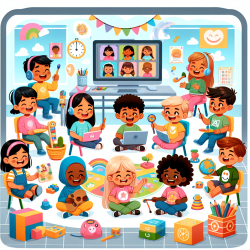Welcome to the World of Cultural Socialization
As a practitioner working with Latinx youth, you play a pivotal role in shaping their social responsibility and community engagement. The recent research article titled "From home to the streets: Can cultural socialization foster Latinx youths' social responsibility?" provides valuable insights into how cultural socialization can be a game-changer in fostering social responsibility among Latinx youth.
Key Findings from the Research
The study explored the impact of parental cultural socialization on Latinx adolescents' sense of social responsibility. It found that cultural socialization directly enhances youth's care for their community. Moreover, indirect associations were observed via family civic socialization and sociopolitical discussions at home. In simpler terms, when parents engage their children in conversations about cultural heritage and current sociopolitical issues, it significantly boosts the youth's sense of responsibility towards their community.
Why This Matters
Understanding these dynamics is crucial for practitioners who aim to cultivate a sense of social responsibility in Latinx youth. By integrating cultural socialization strategies, you can help youth develop a stronger connection to their heritage and a greater commitment to community well-being.
Practical Tips for Practitioners
- Encourage Cultural Pride: Organize activities that celebrate cultural heritage, such as cultural festivals or heritage days. Encourage youth to learn about and take pride in their traditions.
- Facilitate Sociopolitical Discussions: Create safe spaces for youth to discuss current events and sociopolitical issues affecting their communities. This can be done through workshops or discussion groups.
- Model Civic Engagement: Lead by example. Participate in community service projects and invite youth to join. Show them the importance of civic responsibility.
- Connect with Families: Work closely with families to encourage cultural and civic socialization at home. Provide resources and support to help parents engage in these discussions with their children.
Encouraging Further Research
While this study provides valuable insights, it also highlights the need for further research. Encourage your colleagues and peers to explore the nuances of cultural socialization and its impact on youth development. Consider collaborating on research projects or attending conferences to stay updated on the latest findings.
Conclusion
As practitioners, you have the power to shape the future of Latinx youth by fostering a strong sense of social responsibility. By implementing the strategies outlined in this research, you can help youth connect with their cultural roots and become active, responsible members of their communities.
To read the original research paper, please follow this link: From home to the streets: Can cultural socialization foster Latinx youths' social responsibility?










